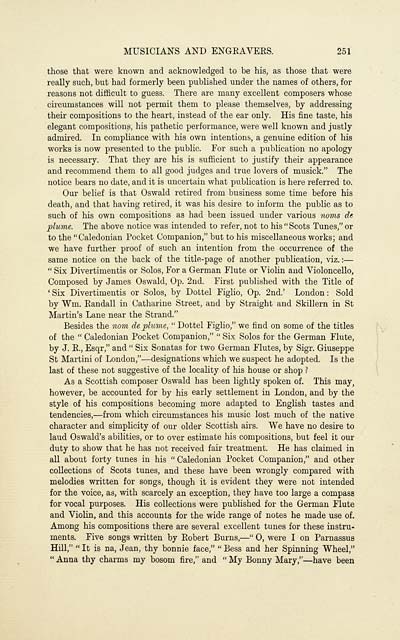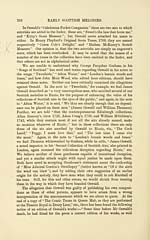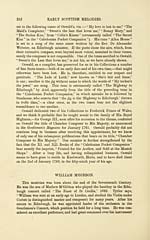Inglis Collection of printed music > Printed text > Early Scottish melodies
(275) Page 251
Download files
Complete book:
Individual page:
Thumbnail gallery: Grid view | List view

MUSICIANS AND ENGRAVERS. 251
those that were known and acknowledged to be his, as those that were
really such, but had formerly been published under the names of others, for
reasons not difficult to guess. There are many excellent composers whose
circumstances will not permit them to please themselves, by addressing
their compositions to the heart, instead of the ear only. His fine taste, his
elegant compositions, his pathetic performance, were well known and justly
admired. In compliance with his own intentions, a genuine edition of his
works is now presented to the public. For such a publication no apology
is necessary. That they are his is sufficient to justify their appearance
and recommend them to all good judges and true lovers of musick." The
notice bears no date, and it is uncertain what publication is here referred to.
Our belief is that Oswald retired from business some time before his
death, and that having retired, it was his desire to inform the public as to
such of his own compositions as had been issued under various noms de
plume. The above notice was intended to refer, not to his " Scots Tunes," or
to the "Caledonian Pocket Companion," but to his miscellaneous works; and
we have further proof of such an intention from the occurrence of the
same notice on the back of the title-page of another publication, viz. : —
" Six Divertimentis or Solos, For a German Flute or Violin and Violoncello,
Composed by James Oswald, Op. 2nd. First published with the Title of
' Six Divertimentis or Solos, by Dottel Figlio, Op. 2nd.' London : Sold
by Wm, Randall in Catharine Street, and by Straight and Skillern in St
Martin's Lane near the Strand."
Besides the nom de plume, " Dottel Figlio," we find on some of the titles
of the " Caledonian Pocket Companion," " Six Solos for the German Flute,
by J. R., Esqr," and " Six Sonatas for two German Flutes, by Sigr. Giuseppe
St Martini of London," — designations which we suspect he adopted. Is the
last of these not suggestive of the locality of his house or shop ?
As a Scottish composer Oswald has been lightly spoken of. This may,
however, be accounted for by his early settlement in London, and by the
style of his compositions becoming more adapted to English tastes and
tendencies, — from which circumstances his music lost much of the native
character and simplicity of our older Scottish airs. We have no desire to
laud Oswald's abilities, or to over estimate his compositions, but feel it our
duty to show that he has not received fair treatment. He has claimed in
all about forty tunes in his " Caledonian Pocket Companion," and other
collections of Scots tunes, and these have been wrongly compared with
melodies written for songs, though it is evident they were not intended
for the voice, as, with scarcely an exception, they have too large a compass
for vocal purposes. His collections were published for the German Flute
and Violin, and this accounts for the wide range of notes he made use of.
Among his compositions there are several excellent tunes for these instru-
ments. Five songs written by Robert Burns, — " 0, were I on Parnassus
Hill," " It is na, Jean, thy bonnie face," " Bess and her Spinning "Wheel,"
" Anna thy charms my bosom fire," and " My Bonny Mary," — have been
those that were known and acknowledged to be his, as those that were
really such, but had formerly been published under the names of others, for
reasons not difficult to guess. There are many excellent composers whose
circumstances will not permit them to please themselves, by addressing
their compositions to the heart, instead of the ear only. His fine taste, his
elegant compositions, his pathetic performance, were well known and justly
admired. In compliance with his own intentions, a genuine edition of his
works is now presented to the public. For such a publication no apology
is necessary. That they are his is sufficient to justify their appearance
and recommend them to all good judges and true lovers of musick." The
notice bears no date, and it is uncertain what publication is here referred to.
Our belief is that Oswald retired from business some time before his
death, and that having retired, it was his desire to inform the public as to
such of his own compositions as had been issued under various noms de
plume. The above notice was intended to refer, not to his " Scots Tunes," or
to the "Caledonian Pocket Companion," but to his miscellaneous works; and
we have further proof of such an intention from the occurrence of the
same notice on the back of the title-page of another publication, viz. : —
" Six Divertimentis or Solos, For a German Flute or Violin and Violoncello,
Composed by James Oswald, Op. 2nd. First published with the Title of
' Six Divertimentis or Solos, by Dottel Figlio, Op. 2nd.' London : Sold
by Wm, Randall in Catharine Street, and by Straight and Skillern in St
Martin's Lane near the Strand."
Besides the nom de plume, " Dottel Figlio," we find on some of the titles
of the " Caledonian Pocket Companion," " Six Solos for the German Flute,
by J. R., Esqr," and " Six Sonatas for two German Flutes, by Sigr. Giuseppe
St Martini of London," — designations which we suspect he adopted. Is the
last of these not suggestive of the locality of his house or shop ?
As a Scottish composer Oswald has been lightly spoken of. This may,
however, be accounted for by his early settlement in London, and by the
style of his compositions becoming more adapted to English tastes and
tendencies, — from which circumstances his music lost much of the native
character and simplicity of our older Scottish airs. We have no desire to
laud Oswald's abilities, or to over estimate his compositions, but feel it our
duty to show that he has not received fair treatment. He has claimed in
all about forty tunes in his " Caledonian Pocket Companion," and other
collections of Scots tunes, and these have been wrongly compared with
melodies written for songs, though it is evident they were not intended
for the voice, as, with scarcely an exception, they have too large a compass
for vocal purposes. His collections were published for the German Flute
and Violin, and this accounts for the wide range of notes he made use of.
Among his compositions there are several excellent tunes for these instru-
ments. Five songs written by Robert Burns, — " 0, were I on Parnassus
Hill," " It is na, Jean, thy bonnie face," " Bess and her Spinning "Wheel,"
" Anna thy charms my bosom fire," and " My Bonny Mary," — have been
Set display mode to: Large image | Transcription
Images and transcriptions on this page, including medium image downloads, may be used under the Creative Commons Attribution 4.0 International Licence unless otherwise stated. ![]()
| Special collections of printed music > Inglis Collection of printed music > Printed text > Early Scottish melodies > (275) Page 251 |
|---|
| Permanent URL | https://digital.nls.uk/94646572 |
|---|
| Description | Scottish and English songs, military music and keyboard music of the 18th and 19th centuries. These items are from the collection of Alexander Wood Inglis of Glencorse (1854 to 1929). Also includes a few manuscripts, some treatises and other books on the subject. |
|---|
| Description | The Glen Collection and the Inglis Collection represent mainly 18th and 19th century Scottish music, including Scottish songs. The collections of Berlioz and Verdi collected by bibliographer Cecil Hopkinson contain contemporary and later editions of the works of the two composers Berlioz and Verdi. |
|---|

